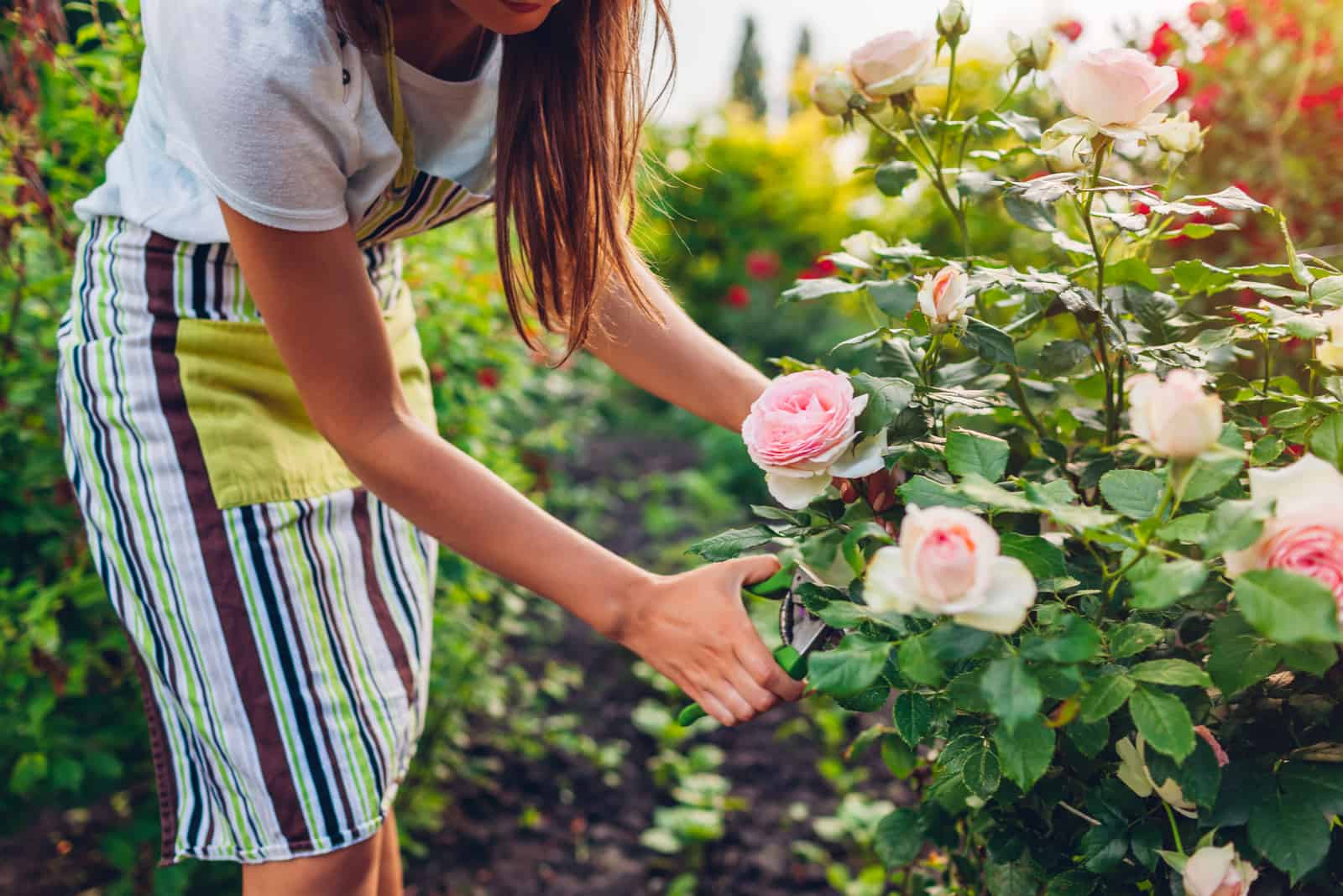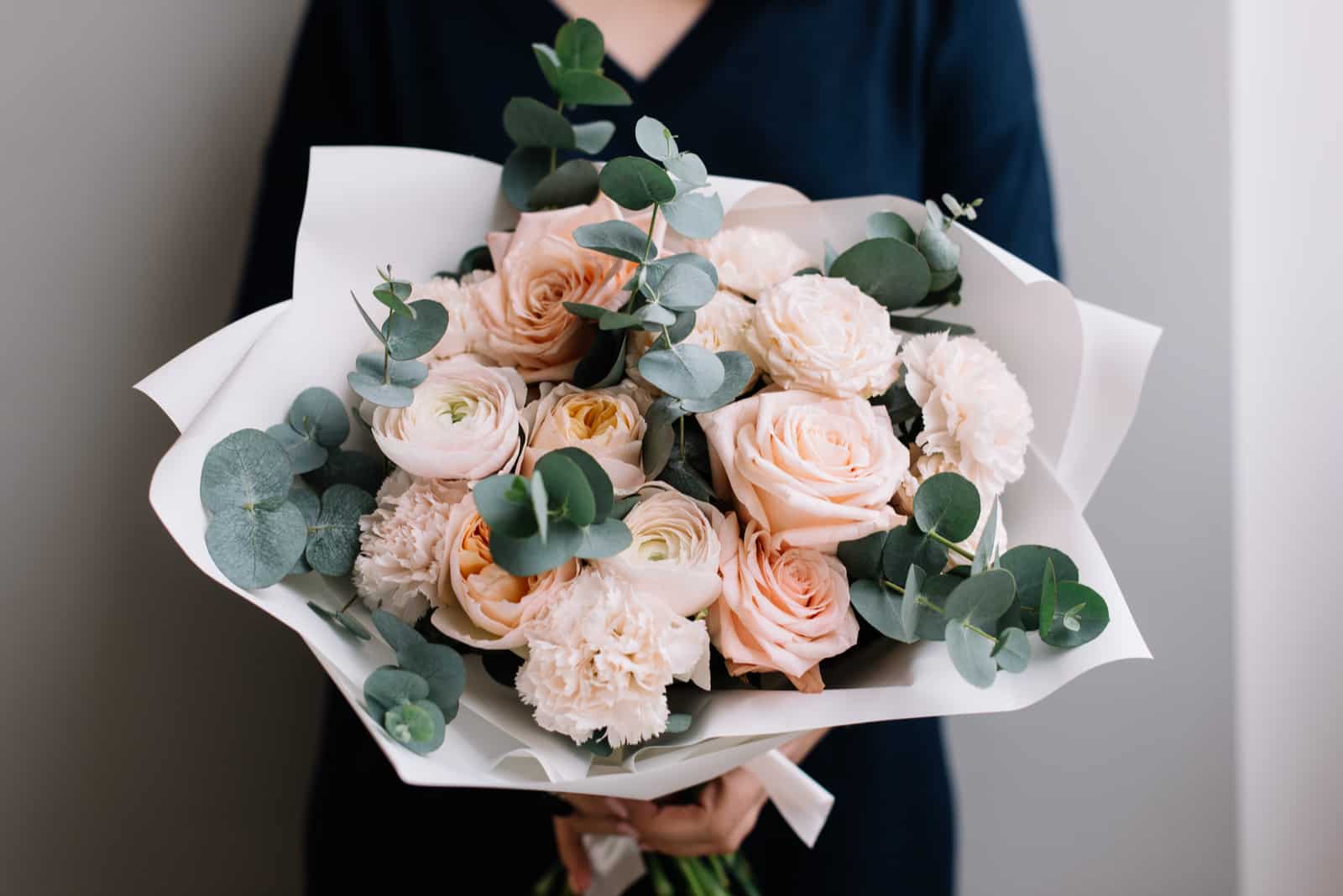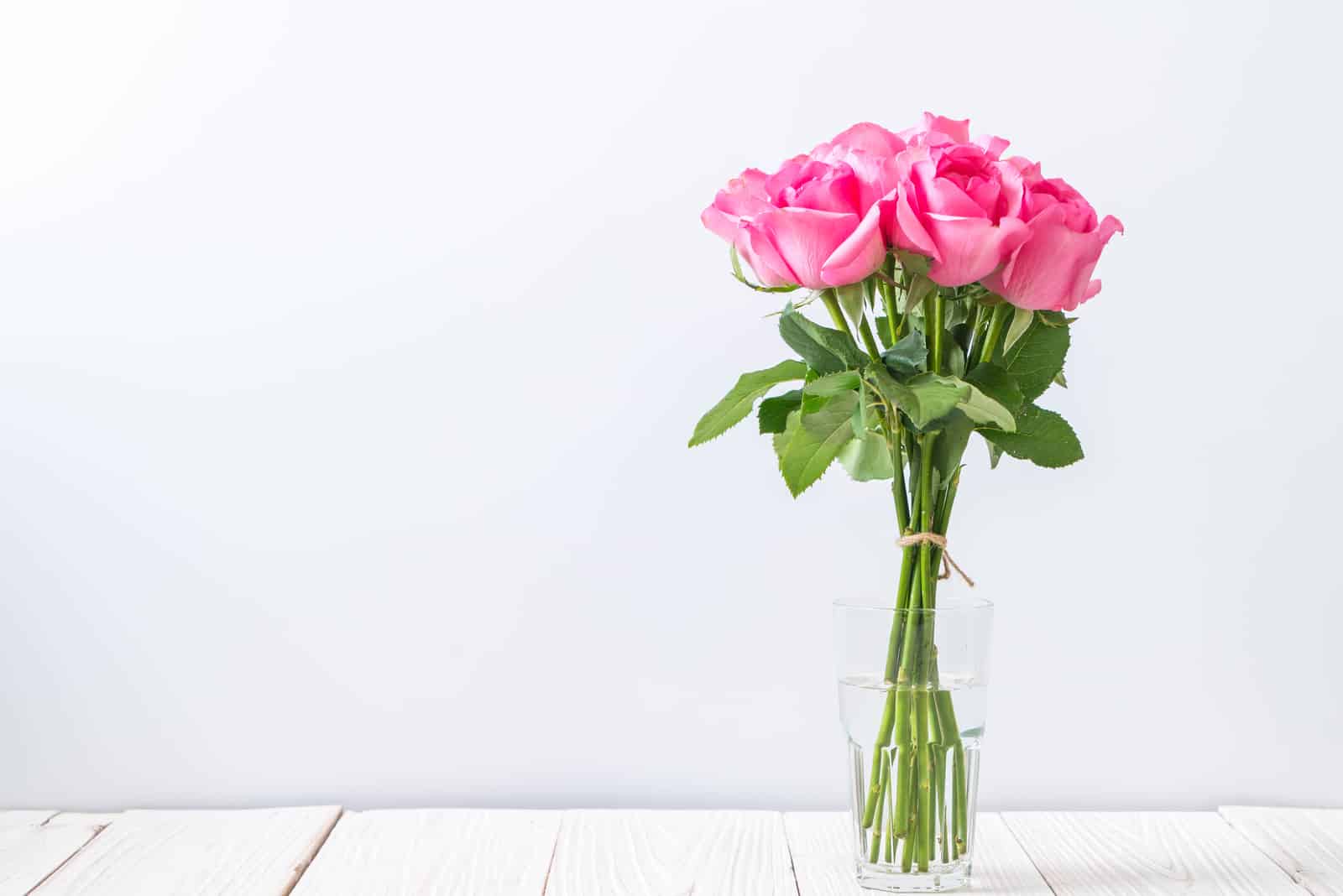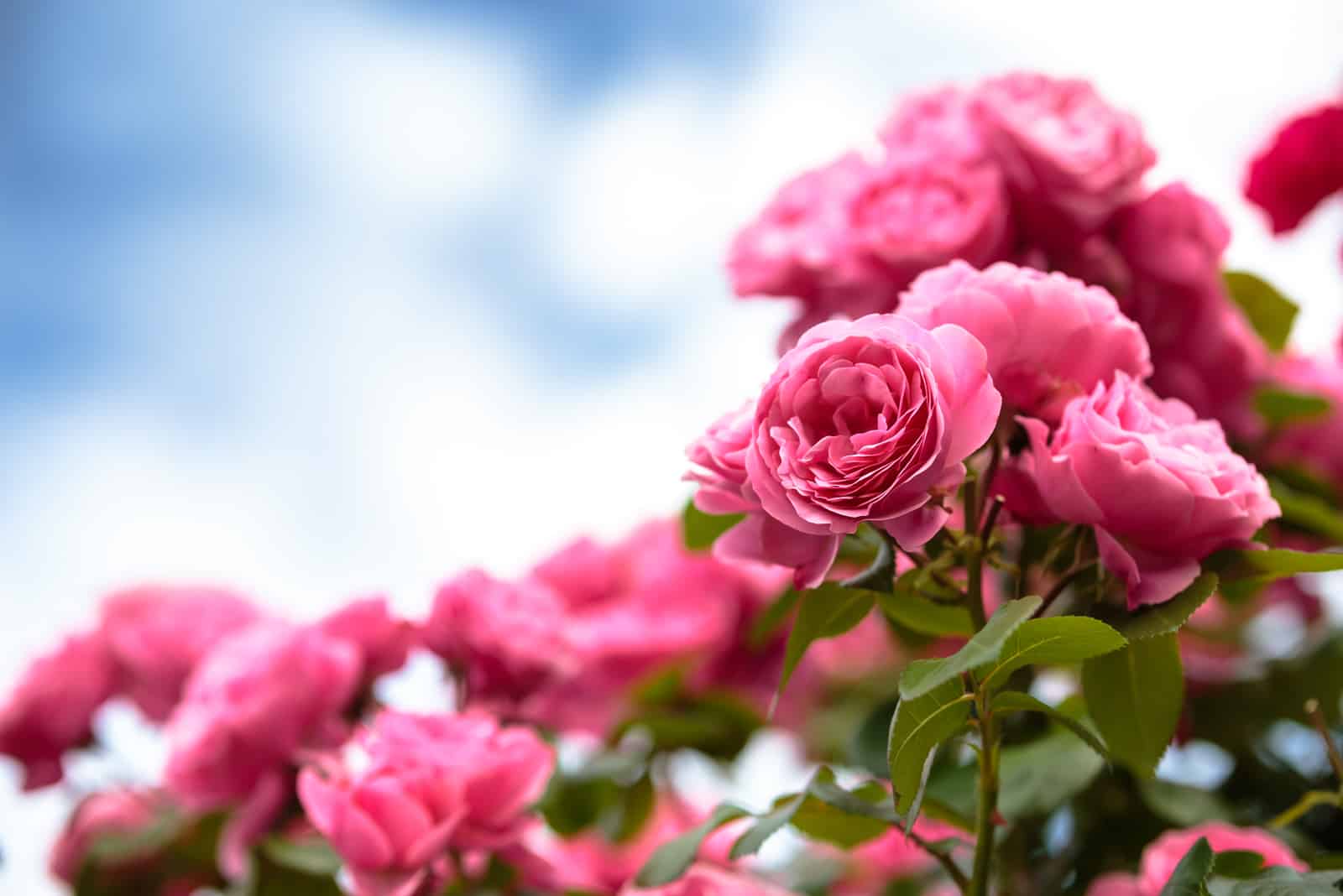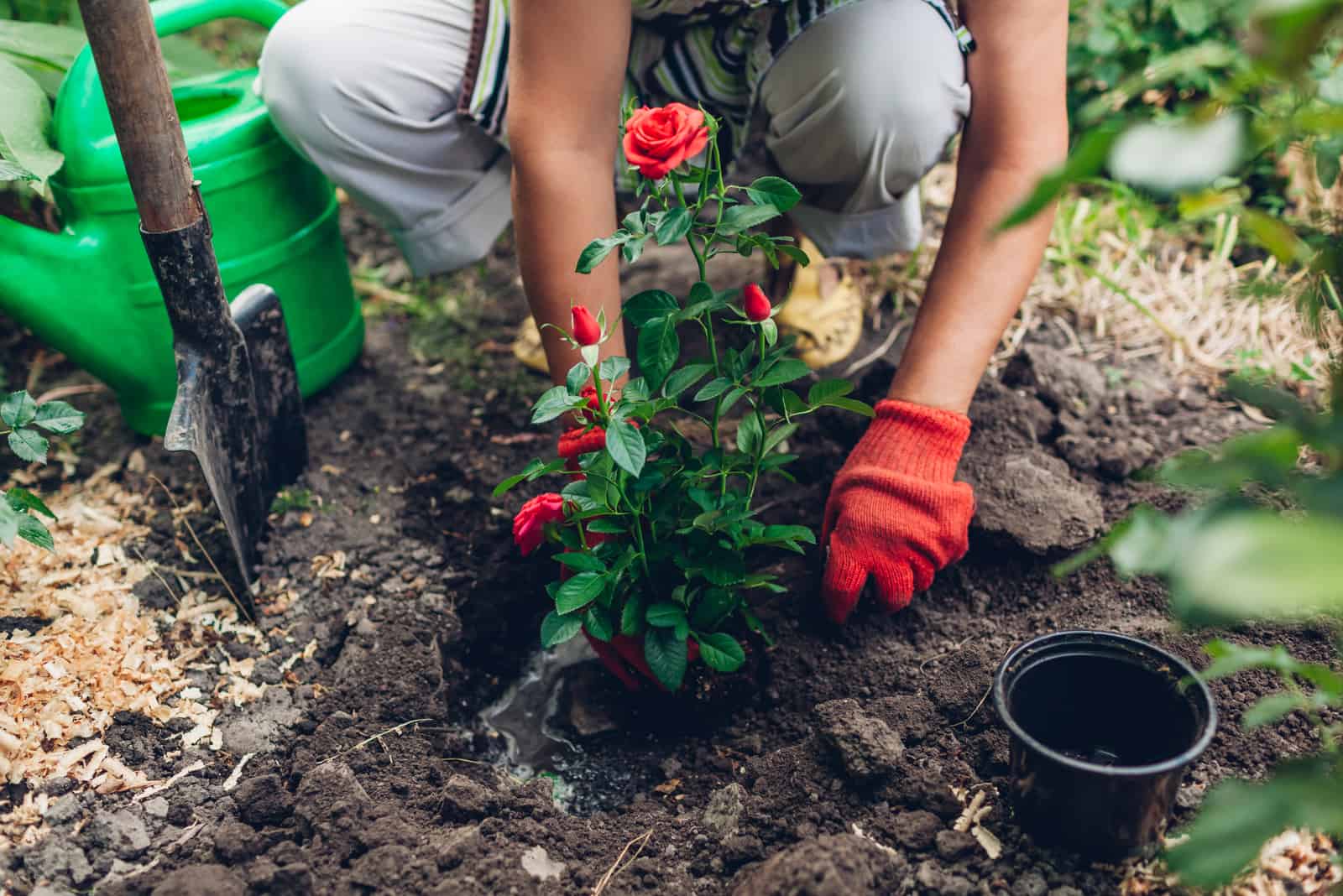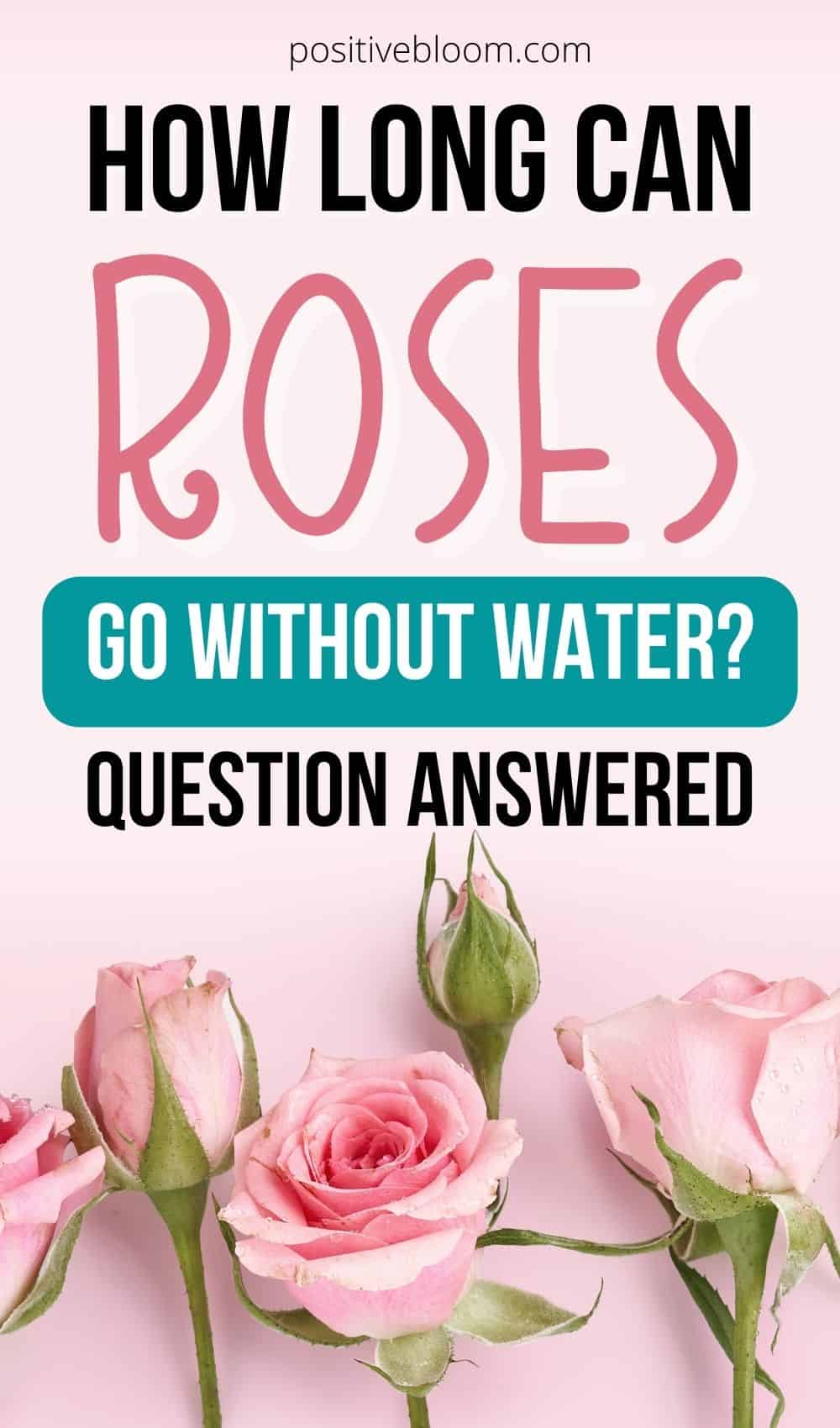Positive Bloom is an Amazon Associate and we earn from qualifying purchases through these links at no extra cost to you.
Roses are a girl’s best friend. We all love receiving them on birthdays, Valentine’s Day, Mother’s day, and so on. But there is that eternal question: How long can roses go without water?
This article will tell you everything you need to know about roses and how long roses last without water. However, there is a difference between cut roses and rose bushes in terms of their lifetime, and this article brings you both.
First, here’s some basic info:
[table id=23 /]Now that your inner florist is awakened, it is time you found out everything about rose care so that you can grow your own or extend their vase life.
How Long Can Roses Go Without Water?
Roses are sturdy plants, and they can survive a few hours without water thanks to the water stored in their stem.
Of course, when the weather is hot, roses can last up to an hour without water. But, if the weather is colder, and the cut roses don’t lose water by transpiration, they can last even eight hours without water.
However, you need to immerse roses in water as soon as possible since this will tremendously prolong their lives. If the roses are left without water for an hour, it reduces their lifespan for one day, and so on.
Also, if the rose blooming cycle hasn’t started yet, they will survive longer without water.
Which Water To Use For Roses In A Vase
Cut roses may have specific issues that you need to address, and one way to do this is by choosing the correct water temperature.
Florists keep their secrets about which water to use for prolonging the shelf life of roses. However, we have caught a glimpse into their black ledger, and we are more than happy to share it with you.
1. Hot Water
Hot water can be beneficial for roses with withered stems. If the stems are extremely wilted, then you may need extremely hot water, up to 180-200°F (82-93°C).
Afterwards, you just need to move them into a refrigerator, and your roses will cheer up in no time. If you don’t do this, your flowers will start to wither and rot in a few days.
2. Ice Water
The other extreme that I was unwilling to try was putting cut roses in ice water. However, this is quite helpful if your roses have air pockets because bubbles from these pockets prevent water absorption.
Ice cold water unclogs the veins by dissolving these air pockets, allowing better water absorption.
3. Lukewarm Water
Contrary to popular opinion, lukewarm water isn’t necessary. The story goes that you need warm water for the flower food to dissolve, but it is not true.
However, if your flowers have somewhat withered and you want them renewed, lukewarm water can help you with that.
4. Tap Water
Tap water is the easiest option that is widely available. Its temperature is between 50-60°F (10-15°C), which can dissolve the air pockets without stressing the plant too much.
Add some flower food or sugar, and your roses will last many a day.
How To Prolong The Lifespan Of Cut Roses
Cut roses can decorate your living room for many days. There are many ways to extend the shelf life of roses aside from water.
This section brings you some secret and unusual tips for prolonging roses’ lifespan.
1. Way Of Cutting
When you go to your garden to pick a lovely bouquet of roses, you might ignore the way you cut the roses.
Cutting 1 inch (2,5cm) from the base at a 45° angle is crucial because this method doesn’t damage the stems and can keep their ability to absorb water.
It is essential to use sharp scissors because dull gardening shears only damage the stem. Also, if possible, cut the roses under cold water since this can prevent the appearance of air pockets.
2. Deep Water
After you cut the roses, it is vital to place them into a deep container filled with water for at least 6 hours before moving them to a vase.
It would be a good idea to carry a bucket of water with you as you never know when you will see a beautiful rose ready for picking.
3. Freshness
Adding some flower food to a vase is a great way of prolonging the lifespan of your roses. We love the Miracle-gro, and our flowers even more so.
If you don’t have flower food on hand, you can always jump to these alternatives to keep your flowers fresh.
You already know about sugar, so there’s no need to go into any detail about that, but did you know that lemonade can also help you keep them fresh?
Fizzy lemonade raises the sugar level and feeds your plant. The best lemonade you can use for this purpose is the fizziest one you can find.
Another alternative flower food is aspirin. Use the one that dissolves in water, but if you don’t have any on hand, don’t worry; you can always crush a few tablets and put them in water.
How Long Can A Bouquet Last Without Water?
“How long can roses go without water?” is a question that has two answers. In this section, you will learn the answer to the question “how long can cut flowers go without water?” or, more specifically, “how long do roses last when cut?”
Special occasions are times for gifting bouquets, and roses are almost everyone’s favorite.
Whether you have received a bouquet of flowers or have cut some fresh flowers on your own, it doesn’t matter; the care for them is essentially the same.
Roses fall into a group of hardier flowers as they have a lifespan of five days to a week when put in a vase. However, they are neither as robust as lilies or gladiolus, which last one to two weeks when cut, nor are they as delicate as tulips and gardenias, which last only a couple of days.
How To Extend The Shelf Life Of A Bouquet: 9 Tips
Here are some tips on how to prevent roses (and other bouquet flowers) from dying as soon as you pick them:
1. Bucket Of Warm Water
Roses can survive a couple of hours without water. Still, if you want to prolong their shelf life up to two weeks, you should place the cut roses (delphiniums, peonies, or any other flower) in a bucket of warm water because the damage can be done in a matter of minutes.
2. Wet Paper Towel
Something that can also prolong the life of your golden daffodils or colorful zinnias is wrapping them in a wet paper towel before you can put them in a vase of water.
3. Cool Place
Next, put the flower food in the water and keep the vase in a cool place.
4. No Leaves In The Water
Make sure that no leaves are in the water when you put your flowers in a vase because leaves die quickly and can contaminate the water with bacteria, eventually killing your flowers
5. Sugar Or Preservatives
Fresh water with a spoonful of sugar or floral preservative every day (or at least every second day) can make your roses and carnations look as if they haven’t been cut at all.
6. Clean With Bleach
To keep the arrangement looking fresh as long as possible, you should clean the vase with a mild bleach solution to prevent the harmful bacteria from killing your flowers sooner than expected.
7. Clean With Cold Water
Clean the vase with cold water every few days and remove any dead leaves!
8. Recut
Recut the ends of your roses at an angle with a sharp knife every day, and you will see them liven up in no time.
9. Spray With Hair Spray
If you want your bouquet to last for many days, you can consider turning them upside down and spraying them with hair spray, which will prevent them from wilting.
These are the tips that work on all flowers. However, you should consider the type of flowers you have in your vase.
A rose can survive a week in a vase, just like a sunflower, but gardenias last only a day or two!
What Are Some Ways To Care For Roses
Roses are relatively easy to maintain (if you don’t count the pruning, which can be a bit dangerous). They need sunlight and water just like any other flower, and they will decorate your front yard like no diamond or gold could.
In this short rose care guide, you will find out some basic things every rose needs, no matter the variety.
Light
Roses need full sun exposure, which means they require 6-8 hours of direct sunlight to produce their memorable flowers.
If there is not enough sunlight, roses will flower less, become more prone to diseases, and may become tall, weak, and spindly.
However, keep in mind that some roses love the partial shade, so if you opt for climbing roses or floribundas, some shade will not hurt them.
Temperature
Roses are pretty amazing flowers. There are cold-hardy varieties that can endure temperatures well below zero (some say even -40°F), whereas some types love hot summer days and temperatures above 100°F (38°C).
However, most mid-range varieties thrive best in warm temperatures, between 60 and 70°F (15-21°C). However, it would help if you kept in mind that they are more sensitive in winter and require additional protection.
If the temperature falls below 10-15°F (-9 to -12°C), you should consider covering your climbing roses with earth.
Water
Roses love moist soil, but they don’t like to be water-logged, which may lead to fungal infections. The best way to know when your rose needs water is to check the soil. If it’s dry, water the plant, and if it isn’t, then come back sometime later.
However, watering in summer is different from the rest of the year, and of course, it depends on the climate and the environment.
If your area experiences hot, dry summers, you may need to water your rosebush daily. On the other hand, you should cut back the watering to once or twice a week when the weather gets cooler.
Soil And Fertilization
Roses can grow in almost every soil type, but they prefer slightly acidic soil, pH level between 6.0 and 7.0. The ideal soil for roses is well-draining and extremely rich in nutrients and organic content to provide enough aeration.
Fertilizer
Fertilizing roses is not a necessity, but if you want to have a colorful garden with many rose bushes, then fertilizing your roses is something you may want to do.
The thing about fertilization is that it should only be done during the growing season since fertilizing roses in winter when they’re dormant misses the point.
Pruning
The best time to prune roses is in late (really late winter) or early spring. Cut off any dead, weak, or delicate flowers’ stems. Seal the pruning wounds with some pruning sealer, clean the area of cut stems so that pests and diseases don’t start spreading on your roses, and you’re done.
However, this video has some great tips that can help you perfect your pruning technique.
If you are like me and hate pruning because you always get scratched and cut, then growing roses that don’t require pruning is the way to go.
And yes, such roses are real!
Frequently Asked Questions
Strangely, many more questions are related to the subject “how long can roses go without water?” In this section, you may find the answers to your most frequently asked questions.
Is it possible to have roses for a long time without water?
Roses can survive a couple of hours without water if the conditions aren’t too harsh. However, if you compare them to other, less hardy flower types that can last only an hour or sometimes less, then roses last pretty a long time without water.
Also, rose petals can survive up to three days without drying out, and that’s pretty long!
What are the signs that a plant needs water?
The main sign that a plant needs to be watered is dry soil. Other signs are pale foliage or flowers, wrinkles, brown petals or leaves, stunted growth, drooping stems or leaves, or a dying plant.
If you keep flowers in a vase, you should fill it up to 2/3 at least because flowers drink a lot of water (especially if you have received a large bouquet). Feel free to water your flowers if you notice that the water level is lowered.
Wrapping up
Sadly, we’ve reached the end of our journey! I don’t know about you, but I have enjoyed writing about roses.
“How long can roses go without water?” has always been an important question, stewing in the back of every beginner gardener’s mind.
Besides, now you know everything you need to know about watering roses, whether it is a rose bush or a vase full of roses or some other flowers, and you can enjoy the scent of these beautiful flowers for many days.
Until next time!
Like this post? Share or pin it for later!



